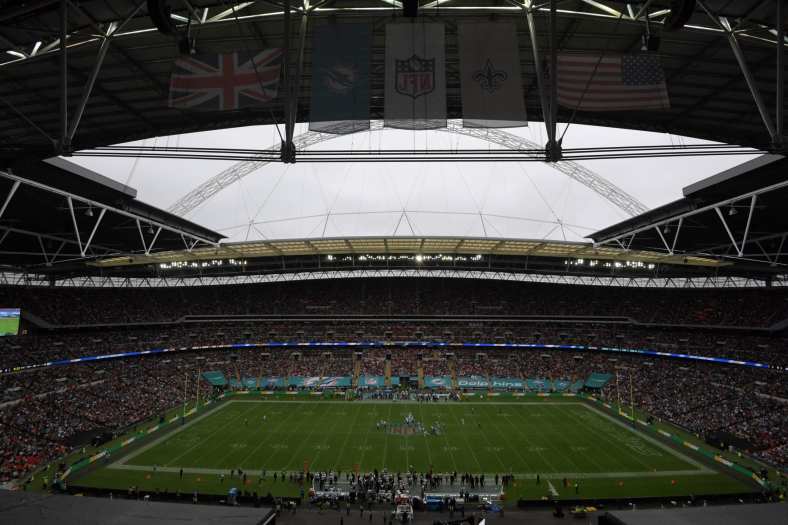
On the verge of purchasing London’s Wembley Stadium, Jacksonville Jaguars owner Shahid Khan is also embroiled in an investigation of corruption stemming from the soon-to-be completed deal.
The backdrop here is rather obvious. Khan didn’t get into the business to buy Wembley simply to have it play host to a game or two per season. It’s the larger picture he’s looking at. The potential of moving the Jaguars from Jacksonville to London.
This isn’t rumor or innuendo. It’s a lot more than that.
“Shahid Khan is not letting the grass grow under his feet,” the Daily Mail reported on Thursday. “Even before the FA Council’s 127 members discuss selling Wembley Stadium to him on Thursday, the Fulham owner’s staff are examining how to limit the tax he will pay in the UK when bringing his Jacksonville Jaguars to what until now has been the home of English football.”
The idea would be for the Jaguars to continue to be based in Florida for tax reasons, but to play their home games in London.
It’s not a well-kept secret that the NFL has been attempting to expand its brand to international waters. This week’s game between the Oakland Raiders and Seattle Seahawks in London is the latest example of that.
Though, one now has to wonder whether it’s even feasible for an NFL team to be based in London.
First off, there’s legitimate travel concerns. Teams based in California are forced to take an 11-plus hour flight to London. In Seattle, that flight increases to about 12 hours. It’s a major issue. The NFL knows this. That’s why teams playing in London receive a bye the following week. Logistically, this would be a nightmare.
Secondly, the United Kingdom tax system is vastly different than what we use in the states. It’s not like Canada, where the differences can be made up through contract details and the like. This website explains the structure in detail.
As is the case with the other three major professional sports leagues in North America, market-based economics plays a role here. London boasts a population of north of 8 million. That’s double the population of Los Angeles and just below the population in the United States’ largest market, New York City.
For comparison’s sake, Jacksonville’s population is under 900,000. On the surface, the London market would be a boon for both the Jaguars and the NFL. That’s until we realize just how irrelevant large markets have been when it comes to local television ratings.
Look at it this way. Los Angeles and New York boast three teams that represent the lowest local TV ratings thus far on the season. The other is an Oakland Raiders team that’s moving from a huge Northern California market to a growing, but still small, Las Vegas population center.
This has to be a major concern for the NFL and Commissioner Roger Goodell.
Individual economics also have to play a role in the decision-making process. While reducing in size over the past few years, those living in poverty in London represent a huge chunk of the population. According to New Policy Institute in the UK, 27 percent of Londoners live in poverty. That number is between 17 and 18 percent in Jacksonville. Yes, this is a marked difference.
There’s also a certain thing called legality. If Khan is looking to bypass international tax laws by continuing to base a hypothetical London Jaguars team in Duval, would the UK even have that?
Despite all of these hurdles, the NFL’s focus on London leads us to believe that a team based in the European capital is inevitable. And in reality, the league’s other 31 teams would be all for it. Remember, the NFL’s economic model includes even revenue share between the teams.
In London, the revenue these Jaguars create would be a lot more than we’re currently seeing in Jacksonville. In and of itself, that would lead to a relocation vote heavily titled in Khan’s favor. It’s not dissimilar to when the then-St. Louis Rams relocated to Los Angeles prior to the 2017 season. As is the case when it comes to any economic dynamic, it’s all about the individual’s bottom line.
Owners won’t pass up on the possibility of earning more cold-hard cash, even if the logistics and everything else mentioned above act as roadblocks for both the NFL and the Jaguars.